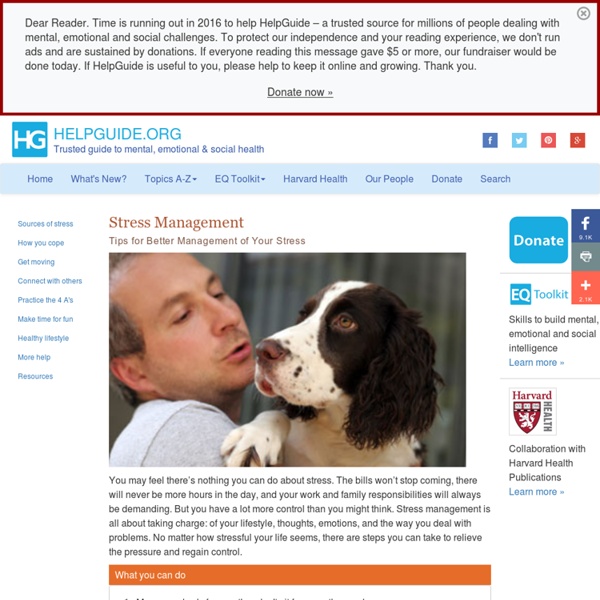Stress Management and Coping with Stress - Psych Central
Stress is a normal part of everyday life -- there's no escaping it. However, there are some ways to deal with it that are more healthy and beneficial than others. For instance, drinking alcohol is actually not a good way to deal with stress over the long-term, while regularly exercising is. Our collection of stress management articles is designed to help you figure these things out and find what works best for you in dealing with the stress in your life. The Basics of Stress Stress Management BasicsStress management starts by understanding how your body responds to stress. Stress Management Techniques 5 Ways to Stress Less Stress is different things to different people. 4 Tips to Change the Way you Deal with Stress20 Tips to Tame Your Stress Perform diaphragmatic or “deep breathing” exercises.Tips for Better Managing Your StressThere are many simple yet surprisingly effective ways to manage your stress. More Stress Management Articles Additional Articles on Stress
Life Skill - Assertiveness
What is Assertiveness? Assertiveness is the ability to honestly express your opinions, feelings, attitudes, and rights, without undue anxiety, in a way that doesn't infringe on the rights of others. Where does Non-Assertive Behavior come from? Many of us are taught that we should always please and/or defer to others, that it is not nice to consider our own needs above those of others, or that we shouldn't "make waves", that if someone says or does something that we don't like, we should just be quiet and try to stay away from that person in the future. Why is Assertiveness important? If you don't know how to be assertive, you might experience: Depression -- Anger turned inward, a sense of being helpless, hopeless, or of having no control over your life.Resentment -- Anger at others for manipulating or taking advantage of you.Frustration -- Why did I allow that to happen? Most people find it easier to be assertive in some situations than in others. Is Assertiveness always the best way to go?
37 Stress Management Tips
Stress is a fact of life, but being stressed out is not. We don’t always have control over what happens to us, says Allen Elkin, Ph.D., director of the Stress Management Counseling Center in New York City, and yet, that doesn’t mean we have to react to a difficult, challenging situation by becoming frazzled or feeling overwhelmed or distraught. Being overly anxious is not just a mental hazard; it’s a physical one too. 1. 2. 3. 4. 5. Next: More stress management tips »
How stress affects your body - Sharon Horesh Bergquist
Let’s take a closer look at how the stress response works. When your brain senses danger, your amygdala, the part of your brain that helps with emotional processing, sends an alarm signal to your hypothalamus. Acting as command central, your hypothalamus activates your sympathetic nervous system. This part of your autonomic nervous system leads to the release of adrenaline (also known as epinephrine) from your adrenal glands into your blood stream. All this happens in a split second. After adrenaline subsides, the second phase of your stress response kicks in. There are two parts to your stress response—turning it on and turning it off. Without the latter relaxation phase of the stress response, stress can spiral into a chronic state. Stress can even take years off your life. Fortunately, you can dampen your stress response by changing how you perceive a stressful event.
Manage Stress
Setting SMART Goals for Students and Employees | Administrate
Teaching students to set goals for themselves is not a skill that is typically taught in most educational situations, yet it is a valuable life long discipline. Most managers will agree that in order to be successful one must begin with the end in mind. Both students and employees can therefore benefit from learning how to set goals. The old adage of “if you fail to plan, you plan to fail!” Set SMART Goals A helpful guide to setting goals is found within the acronym SMART. Specific Goals need to be well defined and easy to understand. Example: I want to get in shape, so I will run a marathon with Bob, in Boston, on July 21st. This example answers our five “W” questions and can be understand by anyone. Measurable Clear goals should have ways to track progress, both for motivation and for accountability. How Much? Any other quantifiable factor is fine for measurement. Example: I will follow Hal Higdon’s marathon training schedule each week, and look to finish the marathon in under 4:30.
How Chronic Stress Leads to Hormone Imbalance - The Paleo Mom
When we think about the effects of chronic stress, we think of cortisol. We think of weight gain, especially around the middle. We think of headaches and depression and anxiety. We think of poor sleep quality. Those of us who are very knowledgeable about health and nutrition think of increased cardiovascular disease risk. Not many of us think about PMS, low libido, heavy or irregular periods, or amenorrhea. As you’ve probably heard the likes of Robb Wolf and Diane Sanfilippo say “writing a health book is one of the worst things you can do for your own health“. So, I asked for help. I knew something was broken that diet and lifestyle couldn’t easily fix. We ran a battery of tests. What did surprise me was that I also had hormone imbalance. So, how did that happen? What is the link between stress and sex hormones? And what happens when you’re chronically stressed? And what happens when your sex hormones are out of whack? The HPA Axis The HPG Axis This is an oversimplification. [cc_h_line]



